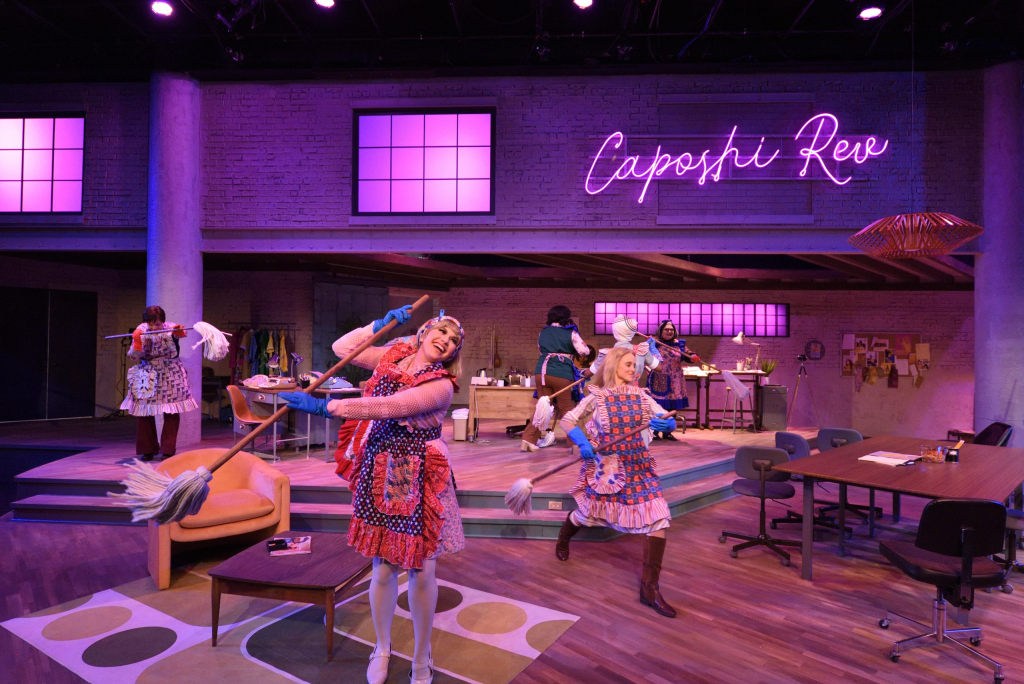By Kimberly Rau

Trinity is hosting the world premiere of Jacqueline Lawton’s “The Inferior Sex,” an engaging look at what it means to be female in a changing world. Trinity’s previews of the event left a lot of people wondering what the show would be like. The good news is: It’s good. Very good.
The year is 1972. Sandra, editor of her pet project feminist fashion magazine, is desperately trying to keep her publication alive without stepping on her father’s conservative toes. Her staff, made up entirely of women at different places in their lives, have conflicting ideas about what feminism means. But it’s not until writer Joan brings her roommate, Gwen, a Black political writer, on board that things start to change. Gwen starts by covering Shirley Chisholm’s political race. Chisolm was the first Black woman elected to Congress and the first Black person to run for president on a major party platform. Some are more resistant to change than others – Vera, the director of fashion for the magazine, has been around longer than the other ladies and has strong opinions on the way things should be, but is still open to change. Slowly, the magazine becomes more inclusive, less afraid to showcase Black designers or hear Black voices.
Then the Watergate scandal hits. Sandra has to choose between running Gwen’s in-depth, groundbreaking story that will certainly sell papers but will also implicate her father, or killing the piece.
Not just a story about working women in the 70s or politics, “The Inferior Sex” also takes a look at intersectional feminism at a time when minority and gay women were (often intentionally) being left out of the conversation. When other voices are allowed space at the table, the result is surprising to our core cast of white women. Case in point: Connie, the Black housekeeper/janitor that Sandra’s family has employed for years, wears a dowdy uniform and keeps to herself, but turns out to be one of the most fashionable and politically informed people in the room.
Over the course of two hours, each woman learns what it means to find her own voice in a crowd of opposition, while still respecting the voices of the women beside her. It’s a witty, fun show with a powerful message. Under the direction of Tatyana Marie-Carlo, the cast delivers it impeccably. Anne Scurria’s Vera is stern and opinionated, but her opinions are forged from experience, and though she is harsh at times, she isn’t unkind. Rachael Warren plays Joan, the writer more interested in politics than fashion, who always tries to do the right thing but often oversteps her boundaries, particularly with roommate Gwen. Warren is fantastic as always, hitting the right notes of earnest but trying just a little too hard. Geri-Nikole Love is Gwen, the extremely talented writer who is bound for bigger things. Love’s portrayal is a nuanced look at a character who comes into her own beautifully over the course of the play. It’s a similar arc that Connie, the housekeeper, gets, and Angelique M. C-Dina does a wonderful job.
Jackie Davis gives a powerful performance as Shirley Chisholm, speaking out throughout the play as though she is on the campaign trail. Shura Baryshnikov is the free-spirited photographer Alice, a woman who definitely seems to have embraced the flower child era of the late 60s, and Baryshnikov plays it up well. Madeleine Russell plays food editor Madeleine, who writes a lovely recipe but can’t cook for beans. Madeleine is definitely meant to be the comic relief of the show, and Russell has the timing for it. Madeleine Barker deftly plays fashion assistant Penny, who is still learning how to balance life as a working mother, and Rachel Dulude does well playing Sandra, playing the little moments that threaten to pull the character apart with an expert understanding.
It’s also a very pretty show. The magazine office is what you’d expect from a publication with a tight budget: gray walls, basic furniture. But the costumes are spectacular. Costume designer Amanda Downing Carney worked hard to incorporate as much true-vintage clothing as she could in the show. The result is a costume lineup that is vastly from the 70s, thanks to the magical resiliency of polyester (you can’t expect that kind of staying power from cotton). The costuming department was careful not to let the costumes detract from the storyline or be too much when all the characters are on stage together, and it’s a perfect glimpse into a microcosm of 70s fashion.
This is a show that is important watching for anyone who entered the workforce in the 70s, as well as for those of us who came after. Those who remember will remember it vividly. Those who cannot will certainly appreciate the road these hard working women tried to pave for the generations to come. Don’t miss this one.
“The Inferior Sex” runs through April 16 at Trinity Rep, 201 Washington St., Providence. Tickets may be obtained at the box office, online at trinityrep.com or by calling 401.351.4242. Masks not required, but encouraged.













